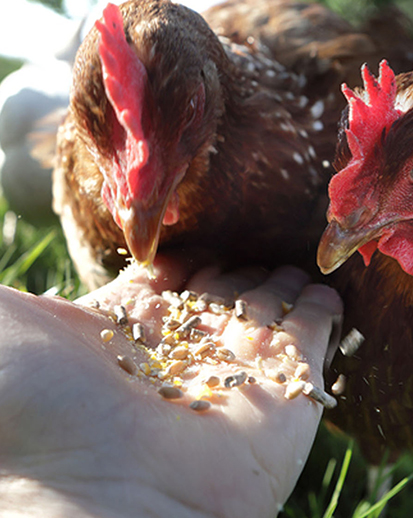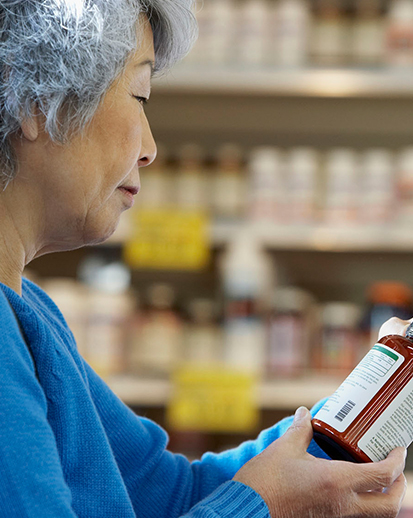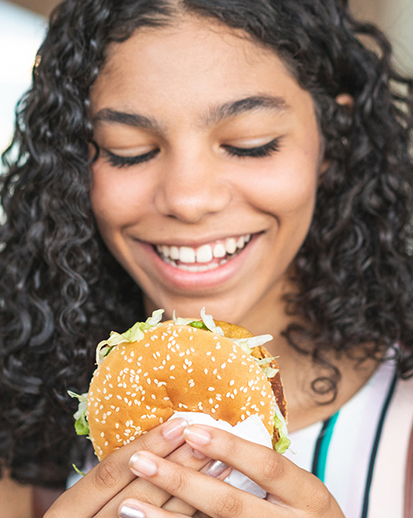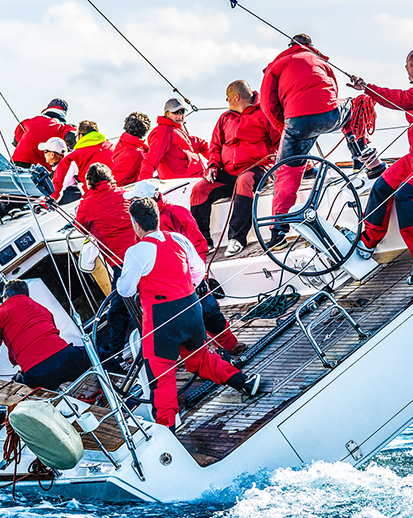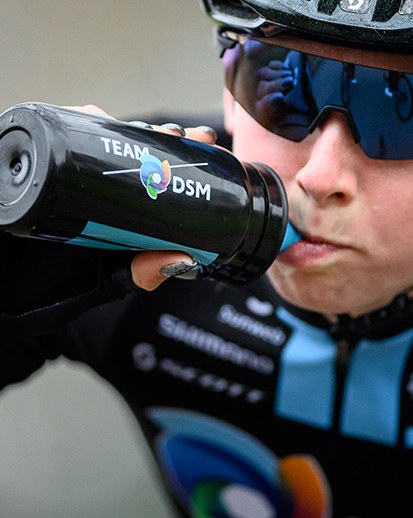Collaborative platforms and networks
We collaborate with like-minded organizations through platforms and networks that contribute to our purpose of creating brighter lives for all. These collaborations are chosen to amplify and accelerate our advocacy efforts in support of a transition to more sustainable economic models on topics that align to our Focus Domains of Nutrition & Health, Climate & Energy, and Resources & Circularity. Collaborative platforms and networks such as these can help formulate new solutions, and measurement and performance methods, as well as roadmaps for business contributions toward achieving the Sustainable Development Goals (SDGs). In this section, we describe some of the most significant initiatives. Due to the impact of COVID-19 in 2020, many of the major events of these platforms and networks, such as the WBCSD Council meeting and the One Young World summit, were postponed or went completely virtual.
Supporting our stakeholders during COVID-19
In 2020, we provided resources and know-how to support our internal and external stakeholders during the Corona crisis. Around the world, we made in-kind and cash donations for the provision of personal protective equipment, disinfectant, test kit equipment, and immunity-optimizing micro-nutrients to help ease the impact of COVID-19 through various local and global initiatives. We also implemented initiatives in-house such as the #optimizeyourimmunity campaign, which are described in more detail in Safety, health & well-being.
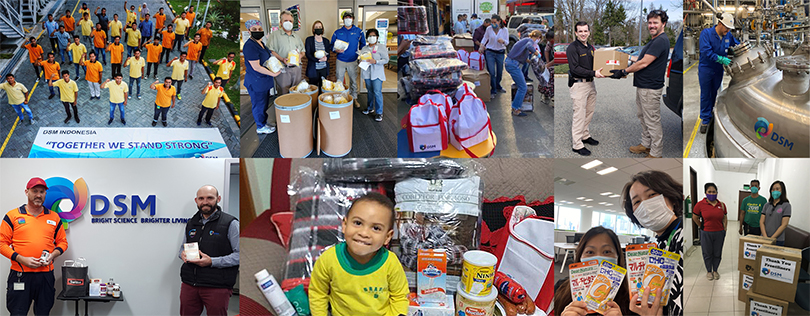
APAC
DSM Japan donated school meals and nutrition services as emergency relief via WFP to children who were impacted by school closures. In India, we partnered with the United Nations Development Program (UNDP) to co-fund and procure electronic ventilators for hospitals. Over 350 employees also contributed to the fund. DSM Singapore supported the Migrant Workers’ Centre, a local NGO, with funds and nutritional supplements to support migrant workers and the volunteers at the Centre. Donations were also raised in Korea, Indonesia and the Philippines.
Europe
In the Netherlands, in a strategic cooperation with Auping and AFPRO filter, we manufactured face masks for healthcare workers. We manufactured 2.8 million nose swabs (sufficient to meet the country’s testing needs for three months) and converted a manufacturing facility to produce disinfectant which was donated to Dutch hospitals. In Delft, we contributed expertise and facilities to support TNO, a Dutch research institute, to develop a fast test for COVID-19.
In the Rhine Valley region, our site in Grenzach (Germany) began small-scale manufacture of hand sanitizer that was used on site, donated to local healthcare institutions, and shared with neighboring companies. In Village-Neuf (France), donations of personal protective equipment and sanitizer were made to elderly care homes.
Latin America
In collaboration with some of our main customers, we provided at low, or no cost, ‘DSM Baskets’ containing food and hygiene items for people in need in Brazil. We also donated 70,000 fortified milk cans for social distribution in poor communities.
North America
We donated Immunity Stix, and masks to first responders, hospitals and veterans’ homes, supporting front-line healthcare workers. Two of our Resins sites switched from the production of resins to the production of hand sanitizer. Donations of face shields and other equipment were made by many other DSM sites.
Cross-domain initiatives
World Economic Forum (WEF)
We are a strategic partner of WEF. We actively participated in the annual meeting in Davos in January 2020 as well as WEF’s virtual events throughout 2020. In 2020, our Co-CEO Geraldine Matchett became a member of the Steering Committee of the Consumer Governors and the Food Security Stewards. She also co-chaired the Jobs Reset Summit. Our Co-CEO Dimitri de Vreeze also joined the Steering Committee of the Chemical Governors. Both spoke at various virtual events of the Forum.
We actively contributed to several initiatives in 2020, including the COVID Action Platform, the Stakeholder Principles in the COVID Era, the CEO Consumer Industry Action Group, the CEO Chemical Industry Action Group and the Food Action Alliance. Our VP Organizational Development & Culture joined the WEF Community of Chief Diversity & Inclusion Officers and participated in its roundtable events.
The SDG Tent
During the WEF Annual Meeting 2020, in collaboration with partners including Salesforce, Yara and Cargill, we continued the SDG Tent, a venue for discussing business engagement for achieving the SDGs. Several highly successful events were hosted at the SDG Tent.
World Business Council for Sustainable Development (WBCSD)
We are a member of WBCSD and participate in various working groups and coalitions. In 2020, our Co-CEO Geraldine Matchett was appointed to WBCSD’s Executive Committee.
Food & Nature
We are a founding member of Food Reform for Sustainability and Health (FReSH) project and a Board member of the Food & Nature Program, with the aim to drive food system change. In November, the WBCSD Food and Nature Program published the ‘Healthy & Sustainable Diets’ Chapter of the new ‘Food & Agriculture Roadmap’. This Roadmap builds on existing scientific and agri-food sector recommendations (from organizations including EAT-Lancet, FOLU, FABLE, WHO-FAO, and WRI), and comes up with calls to action for companies to support better consumption choices, produced in a socially and environmentally responsible manner.
Circular Economy
Factor10 is WBCSD’s Circular Economy program and throughout the year, we continued to co-lead the circular metrics workstream, which launched a harmonized set of indicators for measuring circularity on company level at WEF in Davos. We also continued our participation in the circular bioeconomy workstream. In November, the Circular Bioeconomy report was published, highlighting the opportunities, industry conditions and enablers and trends, as well as corporate case studies including cases from DSM. We are piloting the online Circular Transition Indicator tool in the WBCSD Chemical Sector User group.
Redefining Value
Redefining Value is WBCSD’s program supporting external disclosure and decision-making. Before her appointment to the WBCSD Executive Committee, Ms. Matchett was on this program’s board. Early in the year, The Enterprise Risk Assessment project group published their report An enhanced assessment of risks impacting the Food & Agriculture sector. We joined the Company Book working group, a collaboration looking to build a company-centric solution for (non-financial) data collection and analytics for stakeholder interactions. We continued to participate in the Assess and Manage Performance project, exploring performance management practices that build long-term business success within a healthy, sustainable ecosystem.
Climate & Energy, and Vision 2050
We are also active within the WBCSD Climate Policy Working Group, the Climate & Energy Program, the Chemicals group, and the Vision 2050 Refresh project. WBCSD’s Vision 2050 is a vision for the world of 2050 in which more than 9 billion people can live well, within planetary boundaries. It was first introduced in 2010. The ‘refresh’ of Vision 2050 aims to support businesses to accelerate the transformations needed, by providing a common narrative and resource to inform their strategic and sustainability agendas.
Accounting for Sustainability (A4S)
A4S brings together leading CFOs to help embed the management of environmental and societal issues into business processes and strategy, particularly through the finance function. Ms. Matchett is a signatory to the A4S CFO Statement of Support for the TCFD recommendations and the A4S CFO net zero Statement of Support.
In 2020, we participated in various virtual events and meetings, including the participation of two of our senior finance leaders in the A4S Academy, a program which provides an opportunity to senior finance leaders to broaden their perspective on sustainability, the impact it has on business, and how companies can contribute. It enables participants to connect with peers from other companies from a variety of industries to deepen their understanding and obtain practical insights into social and environmental risks and opportunities. We shared our approach on risk management, demonstrating how sustainability risks are embedded in our overall risk management approach in a webinar titled ‘Lead the Way: Managing Future Uncertainty’.
Dutch Sustainable Growth Coalition (DSGC)
The DSGC is a CEO-led coalition of eight Dutch multinational corporations which aims to drive sustainable growth business models that combine economic profitability with environmental and social progress and thus contribute to the achievement of the SDGs. To accelerate this transition in the Netherlands and abroad, the Coalition wants to lead the way and pursues a strategy of Scale — Share — Shape.
In 2020, the Coalition issued a whitepaper Internal Transformation to a Purpose-Driven Organisation providing a roadmap for companies on how to undergo an internal transformation to become truly purpose-led. Together with the SDG Charter and CSR Netherlands, the DSGC urged the Dutch Government and EU Commission to aim for stringent Green Recovery policies to respond to the socioeconomic consequences of the COVID-19 pandemic.
Climate & Energy initiatives
Carbon Pricing Leadership Coalition (CPLC)
We continue to drive carbon pricing and share our experiences on the topic through the Carbon Pricing Leadership Coalition (CPLC). The CPLC’s long-term objective is for effective carbon pricing to be applied throughout the global economy. In addition to facilitating leadership dialogues, the CPLC, together with partners, is also mobilizing business support to put an internal price on carbon. We apply an internal carbon price of €50 per ton CO2eq when reviewing large investments and acquisitions, and we include this in internal management reporting by the business groups.
RE100
Our engagement with RE100, the world’s leading campaign to scale up the corporate sourcing of renewable power, continued throughout 2020. We participated in the learning opportunities, conferences and advocacy opportunities offered to us in Europe, the US and China. In 2020, we were one of three shortlisted companies for Best Green Catalyst award for the RE100 Leadership Awards.
We Mean Business
We Mean Business activates hundreds of companies and investors to commit to low-carbon initiatives. Our Vice President Sustainability sits in the Business Advisory Board. In 2020, we worked on several advocacy and communications activities that called for governments to urgently match their ambition and policies to limit global temperature rise to 1.5°C above pre-industrial levels, couple COVID-19 recovery effort with climate action, and demonstrate the private sector’s support for these efforts.
Global Center and Commission on Adaptation (GCA)
We have partnered with the Global Center on Adaptation (GCA), particularly by lending our expertise in food security, and helping smallholder farmers manage risks and climate shocks through Africa Improved Foods (AIF), but also by mobilizing the private sector to adopt an integrated strategy to address climate adaptation alongside climate mitigation efforts.
Taskforce on Scaling up Voluntary Carbon Markets
We are a member of the Taskforce on Scaling up Voluntary Carbon Markets, a private sector-led initiative working to improve the credibility and functionality of an effective and efficient voluntary carbon market to help meet the goals of the Paris Agreement. The taskforce is providing insights and recommended actions for the most pressing pain-points facing voluntary carbon markets.
Science Based Targets Initiative: Net-Zero Expert Advisory Group
We joined the Net-Zero Expert Advisory Group in 2020. This group will develop a standard to guide the formulation and assessment of science-based net-zero targets in the corporate sector led by the Science Based Targets Initiative. The standard is expected to be the basis for driving the adoption of corporate net-zero targets that are consistent with action needed to limit warming to 1.5°C while minimizing trade-offs with other Sustainable Development Goals.
Resources & Circularity initiatives
Platform for Accelerating the Circular Economy (PACE)
PACE is a public-private collaboration platform that aims to catalyze global leadership from business, government and civil society to accelerate the transition to a circular economy. Our Co-CEO Dimitri de Vreeze represents DSM on the Global Leadership Group, which includes over 40 CEOs, Ministers and heads of international organizations. In 2020, PACE engaged with its members to create circular economy action agendas focusing on four major material flows: plastics, electronics, food systems and textiles. We participated in interviews and supported the review of the action agendas for plastics, electronics and food systems.
Ellen MacArthur Foundation
The Ellen MacArthur Foundation works with and inspires business, academia, policymakers and institutions to re-think, re-design and build a positive future circular economy. In 2020, our employees attended the Foundation’s Network Workshops and Annual Summit online. In addition, the Foundation offered a series of circular economy trainings (basic and advanced) and webinars which were made available to our employees. One of these webinars was about the importance of design choices for a circular economy and featured a speaker from DSM-Niaga. We also continued to take part in the sounding-board of the Foundation’s circularity metrics work throughout the year, supporting the development and launch of their Circulytics 2.0 in November.
Circle Economy
In 2020, we continued our membership with Circle Economy, a social enterprise that emphasizes practical and scalable solutions in the transition toward a circular economy. Circle Economy launched its Circularity Gap Report for the Netherlands early in the year, which emphasized the role of the chemical sector to help accelerate the transition by using more alternative, regenerative sources for production. We continued our involvement in the Circularity Gap Report Roundtable to provide input for, and review the next version of, the Circularity Gap report, which is scheduled for publication in early 2021.
Champions 12.3
In 2020, our co-CEO Geraldine Matchett became a member of Champions 12.3, a coalition of executives from governments, businesses, international organizations, research institutions, farmer groups, and civil society dedicated to inspiring ambition, mobilizing action, and accelerating progress toward achieving Sustainable Development Goal (SDG) Target 12.3 by 2030. SDG 12.3 calls for cutting in half per capita global food waste at the retail and consumer level, and reducing food losses along production and supply chains (including post-harvest losses) by 2030. The coalition also highlighted how DSM is using science to fight food loss and waste across the value chain with its solutions.
Nutrition & Health initiatives
The DSM Malnutrition Partnerships and Programs (MPP) team addresses malnutrition through public-private partnerships, while strengthening our consumer-oriented new business model ‘Programs in Emerging Markets’. Through our partnerships, we learn about effectively creating impact for vulnerable and last-mile population groups. These learnings drive our innovation efforts to create new solutions that address the needs of consumers in emerging and previously underserved markets. In addition, MPP offers opportunities for talent development through exchange programs. In 2020, three DSM employees worked as long-term secondees or on a (part-time, virtual) consultancy project for our partners, benefiting from unique opportunities for personal and professional development.
UN World Food Programme (WFP)
In place since 2007, the DSM-WFP partnership ‘Improving Nutrition, Improving Lives’ aims to improve the nutritional value of the food that WFP distributes. Together, we reached 30 million direct beneficiaries in 2019 (the most recent reporting period) with food improved by the DSM-WFP partnership. Many more were reached through the partnership’s efforts in scaling up fortified rice both through retail channels and in social safety nets, with work underway to develop a framework to measure this reach. Equally importantly, the partnership programs create long-term systemic impact by raising awareness on the importance of nutrition while continuing to develop new scientific and technical solutions. Accordingly, within the current Memorandum of Understanding from 2019–2021, the partnership is prioritizing rice fortification as a proven and cost-effective solution for combating malnutrition, with our partnership’s activities supporting 15 countries globally. Additionally, as the humanitarian organization is moving towards cash-and-voucher systems, the partnership is supporting WFP’s Nutrition Division’s retail strategy to empower consumers to improve their own nutrition and diets.
UNICEF
The DSM–UNICEF partnership has been in place since 2013. The partnership with UNICEF and Sight and Life supports the Government of Nigeria in realizing its vision of scaling up the micronutrient powder (MNP) program nationally, reaching people suffering from malnutrition. It has contributed to reaching over one million children with vital nutrients that have helped save many lives, and the goal is to further scale up the MNP program to reach two million children by the end of 2021. Meanwhile, the partners also collaborate to create an enabling environment for multiple micronutrient supplementation (MMS), a cost-effective solution to reduce maternal anemia and the risk of children being born underweight, too small, and too soon.
The Social Movement on Nutrition program
The partnership expanded to India by supporting the UNICEF engagement of private-sector stakeholders as part of the government’s Social Movement on Nutrition program. The collaboration focuses on mobilizing the private sector around nutrition literacy, through the platform Impact4Nutrition (I4N), which was established in March 2019. In 2020, the platform, which won an internal UNICEF INSPIRE award, had more than 70 companies on board.
Addressing agri-food business development
Furthermore, this partnership is being expanded to address agri-food business development as one of the Global Breakthroughs identified by Generation Unlimited (GenU), a part of the United Nations Secretary General’s Youth 2030 Strategy. The key objective of this expanded cross-sectoral partnership is to embed a longer-term vision for Sustainable Food Systems (GenU SFS) in Africa and build an environment along the agri-food value chain conducive to thriving, sustainable and inclusive business. The partners will develop a business plan to attract young people and prepare them to contribute to sustainable food systems in a way that creates nutrition and food business at scale.
World Vision International
Our partnership with World Vision and Sight and Life, with the slogan of ‘Joining Forces for Last-Mile Nutrition’, aims to bring prosperity and good nutrition to the most vulnerable communities in the Global South. Leveraging the unique capabilities and know-how of each partner, we design and implement sustainable market-based solutions that bridge the gap between public and private efforts for improving nutrition and fostering local economic development. For example, the partners worked on solutions for maize in Rwanda, eggs in Indonesia and distribution channels in Brazil.
The maize value chain in Rwanda
In Rwanda, the partners enable transformation of the local maize value chain, ensuring a more efficient, inclusive and sustainable supply chain. Partners work with and enable smallholder farmers through training and market access, while working on improving the quality of, and access to, raw materials for AIF in Rwanda. After positive results of the initial pilot, the partners are now collaborating for scale-up. AIF’s Super Cereal product is now benefiting 31,600 children and 19,600 women as part of World Vision Rwanda’s COVID-19 response.
The EGGciting project in Indonesia
The EGGciting project in Indonesia focuses on eggs as an important source of nutrition and works to increase the availability, accessibility, and consumption of eggs at the household level in Sulawesi (Indonesia). Partners address bottlenecks in the supply chain and improve the quality of feed, while driving demand on the consumer side for improved nutrition by use of social marketing that stimulates the consumption of eggs as a nutritious product.
Social distribution of nutrition in Brazil
In Brazil, market research to support the social distribution of nutritional products started in 2019. This pilot is projected to transform the distribution of micronutrient-enriched products in Brazil by incubating last-mile nutrition (female) entrepreneurs who serve populations living in hard-to-reach areas. The goal is to improve the accessibility of nutritious products for peri-urban poor, while stimulating empowerment and income of (young) women.
Partners in Food Solutions
Partners in Food Solutions (PFS) works to increase the growth and competitiveness of food companies in Africa. These aims are achieved by inspiring business leaders and linking highly skilled corporate volunteers from a consortium of leading companies including DSM, Cargill, General Mills, Hershey, Bühler, Ardent Mills, and J.M. Smucker Company with promising entrepreneurs and other influencers in the food ecosystem. The seven corporate partners have empowered hundreds of entrepreneurs to work toward stronger, more resilient food value chains across the African continent.
In 2020, DSM employees contributed almost 1,300 volunteer hours working with 46 African clients across 11 countries. By sharing expertise, the volunteers were able to assist local entrepreneurs in growing their businesses and supporting a supplier base of more than 85,000 farmers. In total, 57 DSM volunteers supported 59 service offerings to clients, of which 30 clients are owned or managed by women.
Scaling Up Nutrition (SUN)
The SUN Business Network (SBN) — co-hosted by the Global Alliance for Improved Nutrition (GAIN) and WFP — is the private-sector branch of the SUN Movement. It aims to support businesses in growing the role they play in nutrition and to support SUN countries in developing national business engagement strategies. The SBN is established in 14 countries and supports the development of new networks in 12 countries. These include almost 1,000 companies, mostly small and medium-sized enterprises. The global membership platform currently has 23 members, who have a combined workforce of 1.1 million employees. Our Honorary Chairman Mr. Feike Sijbesma is a member of the Lead Group of the SUN Movement and Co-Chair of the Advisory Group of the Network. Our Vice President Emerging Markets is on the Operations Committee of the SBN.
Supporting SBN projects in Africa
We supported several SBN projects focusing on Sub-Saharan Africa. Together with the SBN global team, we built on the impact and energy of the first ever Nutrition Africa Investor Forum (NAIF) which reframed the dialogue around nutrition and supported the Global Pitch Competition 2020. As an SBN global member, we support the implementation of SBN principles, notably around workforce nutrition commitments; overweight, obesity and diet-related non-communicable diseases; and the delivery of technical assistance to national SBNs and their members. We advocate for business to take a leading role in these important issues and collaborate with SBN for stronger business accountability on nutrition and for the adoption of SMART nutrition pledges by business (UN Food System Summit, Nutrition for Growth Summit).
Africa Improved Foods
Africa Improved Foods (AIF) is an African social enterprise addressing the food challenges facing Africa by building resilient food systems by sourcing, manufacturing and selling nutritious, affordable and accessible products. AIF was launched in 2016 in Rwanda as a public-private partnership between the Government of Rwanda and a consortium of DSM, the Dutch Development Bank (FMO), DFID Impact Acceleration Facility managed by CDC Group plc (CDC), and the International Finance Corporation (IFC), the private-sector arm of the World Bank Group. AIF produces fortified foods made mainly from maize and soybean sourced from over 130,000 smallholder farmers in the region. These products include mineral- and vitamin-rich porridges, and help meet the nutritional needs of vulnerable population groups such as pregnant and breastfeeding mothers, older infants and young children.
AIF’s Kigali factory contributes to the local and regional economy
AIF’s Kigali factory employs over 300 skilled workers with well-paid jobs. Regional procurement of goods and services (such as transportation) has led to indirect economic development across East Africa. With a reach of over 1.6 million consumers daily, AIF contributes significant benefits to the African economy. AIF has proven that this model can be profitable while contributing to SDG 1 (No Poverty), SDG 2 (Zero Hunger) and SDG 13 (Climate Action).
Positive results in 2020 despite the pandemic
In 2020, AIF concluded its third full year of business with a positive EBITDA result. Despite COVID-19, revenue is expected to grow slightly to just over USD 50 million as Super Cereal Plus sales maintained momentum. Business-to-consumer sales also grew significantly as the Nootri brand continues to gain popularity across East Africa. The year also marked the beginning of AIF’s new ambitious growth strategy, with groundwork in Ethiopia and production of fortified porridges and cereals started at a new facility in Kenya.
MANDI
In 2020, we continued to expand MANDI (Making A Nutritional Difference to India), a socio-commercial consumer products business delivering local nutrition and home fortification solutions that are affordable and convenient. The range of home fortification products branded as Nu-Shakti™ includes solutions for staples such as rice and wheat flour, as well as fruit-flavored fortified beverage powder. The business aims to build awareness and education about the importance of health, nutrition and immunity with the aim of tackling widespread malnutrition in India. In 2019, we started distributing through trade partners in modern and traditional retail channels in Tamil Nadu, a state in South India. In 2020, the COVID-19 disruption that began in March halted the expansion plans.
Sight and Life
As a global leader in nutrition, Sight and Life Foundation uses science to change the way nutrition is delivered to people who need it most, specifically women and children.
With the support of DSM, Sight and Life delivers value to the nutrition community by translating science into effective nutrition programming, building public-private partnerships, and developing viable social business models for affordable and nutritious foods.
In 2020, Sight and Life delivered nutritious food during the COVID-19 pandemic in Rwanda, South Africa, and India. The egg hub social business model in Malawi, making eggs available and affordable to low-income households, proved successful and sustainable by producing 3.5 million eggs annually. Sight and Life secured a Grand Challenges India Award to innovate around egg powder, also supported by Children’s Investment Fund Foundation in Ethiopia. Five companies now incorporate the OBAASIMA seal, aiming to create demand for nutritious and affordable food in Ghana. On the topic of workplace nutrition, IMPAct4Nutrition, a public-private platform, was honored with a UNICEF Global INSPIRE Award in ‘Best Multistakeholder Engagement’. Sight and Life mentored young entrepreneurs to develop climate-smart nutrition and pandemic-proof innovations through Elevator Pitch Contests.
New publications focused on key themes, including multiple micronutrient supplementation (MMS), consumer insights, and take-home rations, sharing science-based evidence and expert knowledge. For more information, visit: sightandlife.org.
Initiatives complementing the Focus Domains
Catalyst
We continued to be a Global Supporter of Catalyst — the NGO accelerating women’s progress in the workplace. Our Honorary Chairman Mr. Sijbesma continued his role on the Board of Directors and Ms. Matchett her role on the European Advisory Board.
In 2020, we continued to sponsor the Catalyst work program on Women and The Future of Work. This long-term program focuses on building more human-centric workplaces with strong social values, which are prepared for the impact of technology and rapid change, by ensuring equity in future employability. As part of this program we participated in, and contributed to, research activities and roundtable events.
We provided input to the ‘How we Lead with Inclusion during the Crisis’ reports. In addition, colleagues from our Inclusion & Diversity network participated in Catalyst virtual workshops on: ‘Emotional Tax in the workplace’, ‘Driving Inclusion During the Disruption: The Strategic Advantage of ERGs (Employee Resource Group)’, ‘Unconscious Bias to Inclusive Leadership Virtual Workshop’, ‘Understanding Gender Equity Workshop’, and International Women’s Day 2020: Now Is The Moment To #BiasCorrect’. We also used Catalyst resources on ‘Candid Conversations About Racism and Sexism in the Workplace’ for internal program development.
Valuable 500
In 2020, DSM joined the Valuable 500 organization — a global NGO aimed at unlocking the social and economic value of people living with disabilities across the world. Our new Inclusion & Diversity strategy incorporates a focus on Disability and a new Employee Resource Group (ERG) called ‘The Valuable’ group was established to represent the interests of DSM employees with disabilities. Valuable 500 resources and experts have supported the team to develop the agenda.
One Young World (OYW)
The One Young World Summit gathers 2,000 young leaders from more than 190 countries and all sectors, empowering them to make lasting connections to generate positive change for sustainable development. In 2020, our OYW delegation comprised 18 colleagues representing all our businesses and regions and is our 10th OYW delegation. This delegation will attend the Munich Summit which has been postponed to Spring 2021, due to the COVID-19 pandemic.
Working on business development and internal engagement
The community of over 120 OYW alumni (including our new 2020 cohort) manage different business development and internal engagement projects for sustainability. In 2020, the community launched a Personal Carbon Footprint Calculator, a learning & development game called ‘The DSM Sustainable City’ and a project on Sustainable Packaging, which has already resulted in some packaging substitutions resulting in reduced cost and waste. After two years of progress, the OYW 2018 ‘Tomato Project’ has resulted in a commercial product in collaboration with Nurevas in Ghana and the Swiss Federal Institute of Technology in Zurich (Switzerland). Tomato sauce is for many African countries a widely used staple food. In this project, a tomato sauce was developed, fortified with a wide range of vitamins and minerals. The product will be introduced into the West African market early 2021.
Primary energy is energy that has not yet been subjected to a human engineered conversion process. It is the energy contained in unprocessed fuels.
Final (consumed) energy is the energy that is consumed by end-users. The difference between primary energy and final consumed energy is caused by the conversion process between the two as well as any transmission losses.


